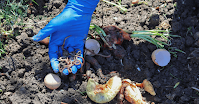Gardening Tips for Recycling Organic Waste: Nourishing the Earth and the Garden
Sustainable gardening is a growing trend, and an important way to make your garden greener is to practice recycling organic waste. Not only does this reduce waste, but it also enriches your garden's soil, promoting healthy plant growth. In this article, we will share valuable gardening tips for recycling organic waste, helping you nurture the earth and garden responsibly.
The Importance of Organic Waste Recycling in Gardening
Recycling organic waste involves using natural materials such as food scraps, leaves, grass clippings and tree bark to create organic compost or compost. This offers a number of benefits:
Waste Reduction: The recycling of organic waste helps to reduce the amount of waste sent to landfills, reducing the environmental impact.
Soil Enrichment: The organic compost resulting from recycling improves soil quality, providing essential nutrients for plants.
Water Conservation: Soil rich in organic matter retains moisture better, reducing the need for irrigation.
Reduced Fertilizer Use: With healthy, nutrient-rich soil, you can reduce dependence on chemical fertilizers.
Encouraging Microbial Life: Decomposing organic matter in the soil creates an ideal environment for beneficial microorganisms, which help break down waste and improve plant health.
Now that we understand the importance of recycling organic waste in gardening, let's explore some practical tips for implementing this practice in your garden.
Gardening Tips for Recycling Organic Waste
1. Start with a Compost Bin
How can I start recycling organic waste in my garden?
Purchase or build a compost bin to house your decaying organic waste. There are composters of different sizes and designs available in the market.
2. Choose the Right Waste
What types of organic waste can I recycle?
Most organic waste such as fruit and vegetable peelings, leaves, small twigs, sawdust and grass clippings can be recycled. Avoid animal waste, such as meat and dairy, which can attract pests.
3. Create a Balanced Layer
How should I stack the waste in the compost bin?
Create alternating layers of green waste (rich in nitrogen, such as food scraps) and brown waste (rich in carbon, such as dried leaves). This helps balance the compound.
4. Keep the Composter Aerated
How can I keep the compost aerated?
Turn the compost regularly with a fork or spade to allow oxygen in. This speeds up the decomposition process.
5. Keep Adequate Humidity
What is the ideal moisture level for compost?
The compost should have the moisture of a damp sponge. If it's too dry, add water; if it's too wet, add dry material such as dried leaves.
6. Be Patient
How long will it take to get ready-to-use compost?
The time needed to get ready compost varies, but it usually takes a few months to a year. The more attention you give the compost, the faster it will decompose.
Faqs on Recycling Organic Waste in Gardening
Can I add diseased plant waste to compost?
It is not recommended to add diseased plant waste to compost as this can spread disease to other plants.
Can I recycle waste paper in compost?
Yes, uncoated paper such as newspaper and cardboard can be added to compost as long as it is chopped into small pieces.
Can I use compost on all my plants?
Compost is suitable for most plants, but check your plants' specific needs to ensure the compost is appropriate.
What should I do if the compost smells bad?
An unpleasant odor in the compost can indicate a lack of aeration or waste balance. Stir the compost and adjust the ratio of brown to green waste.
Can I use compost as a mulch?
Yes, compost is excellent to use as a mulch around plants, helping to conserve moisture and enrich the soil.
Conclusion
Recycling organic waste is an essential practice for sustainable gardening. With the gardening tips for recycling organic waste and understanding the frequently asked questions covered in this article, you will be ready to start or improve the recycling of organic waste in your garden. By enriching the soil with high-quality organic compost, you promote healthy plant growth, save natural resources and contribute to a more sustainable environment. Get started today and reap the benefits of a greener, lusher garden.


